小升初高频考点剖析:第二篇专项提升第二部分第六节介词 课件(共55张PPT)
文档属性
| 名称 | 小升初高频考点剖析:第二篇专项提升第二部分第六节介词 课件(共55张PPT) |  | |
| 格式 | zip | ||
| 文件大小 | 1.2MB | ||
| 资源类型 | 试卷 | ||
| 版本资源 | 通用版 | ||
| 科目 | 英语 | ||
| 更新时间 | 2020-06-21 06:45:20 | ||
图片预览

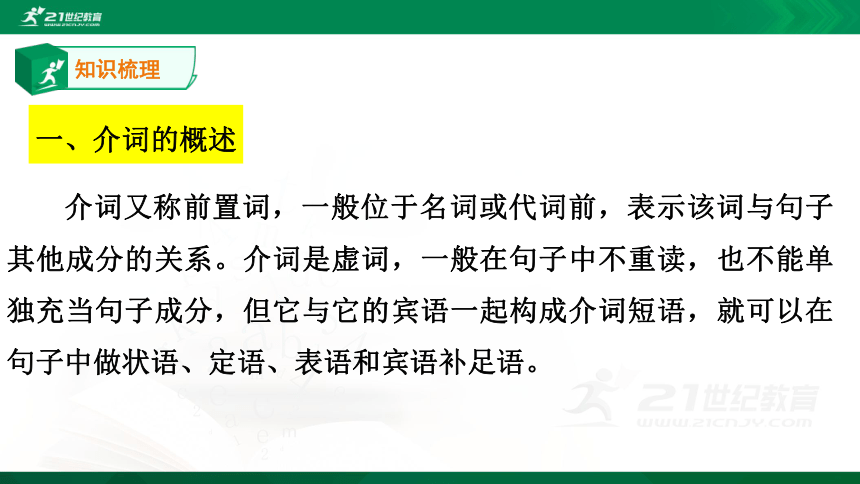
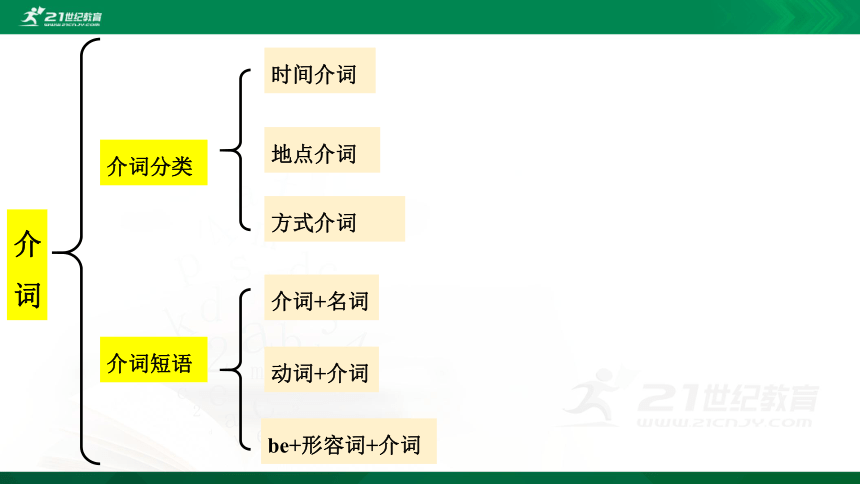
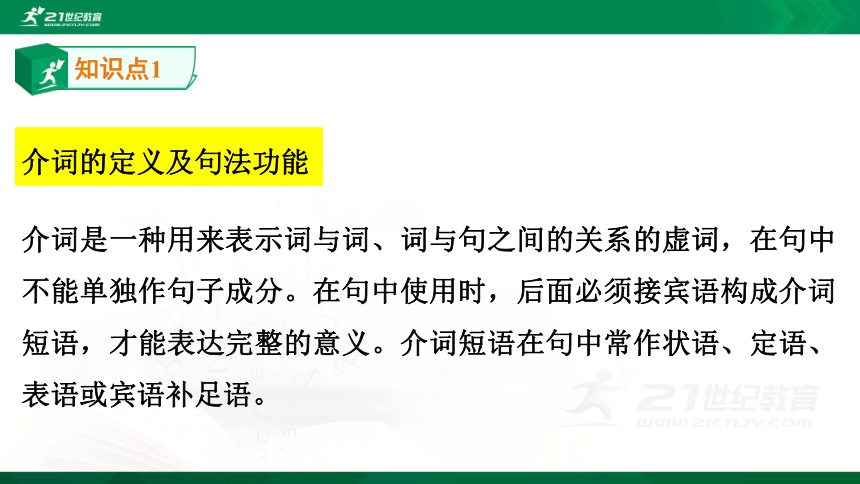
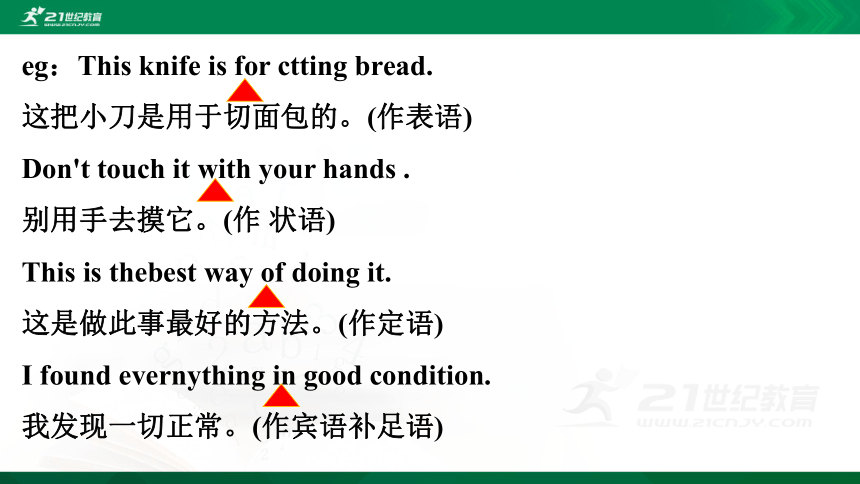
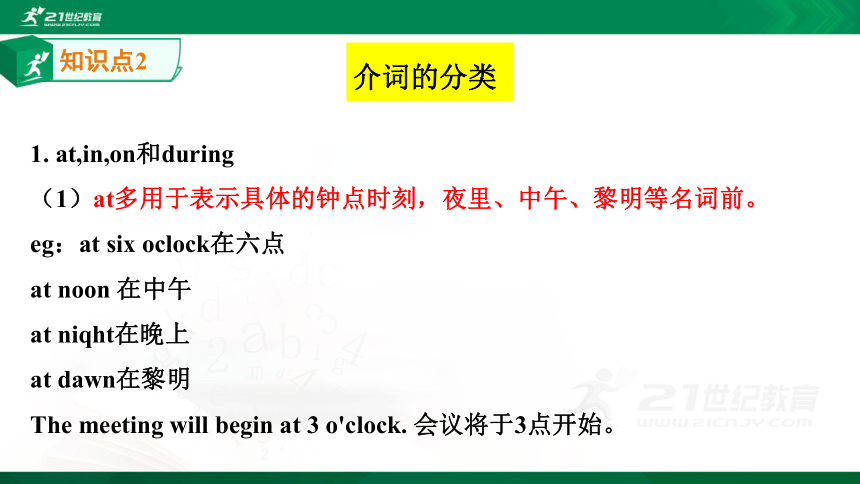
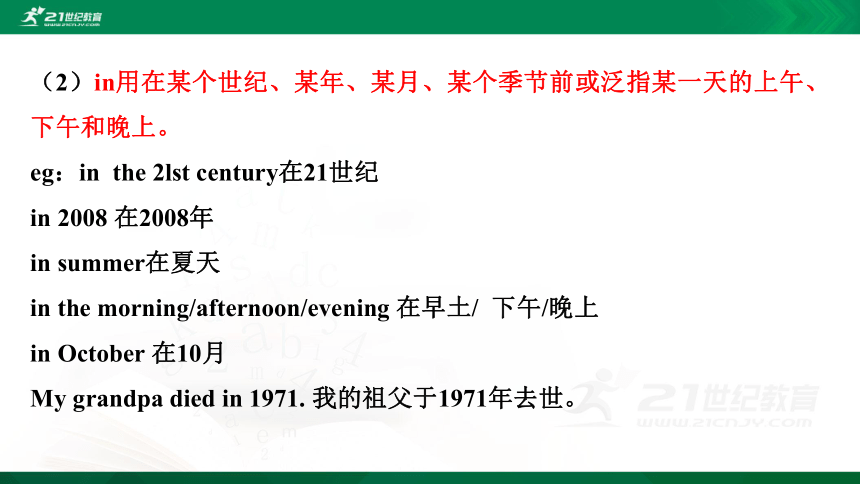
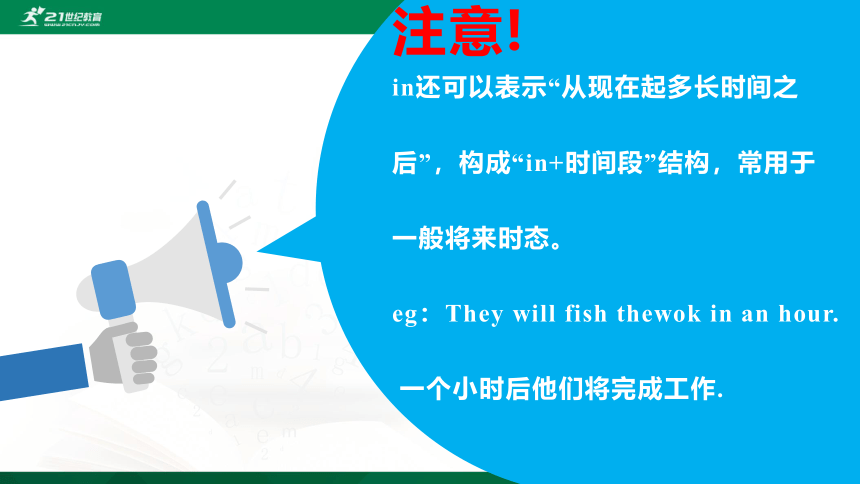
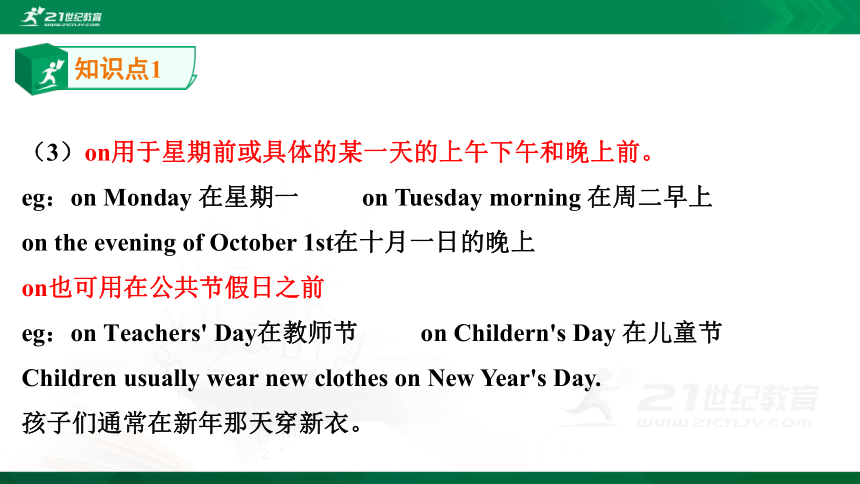

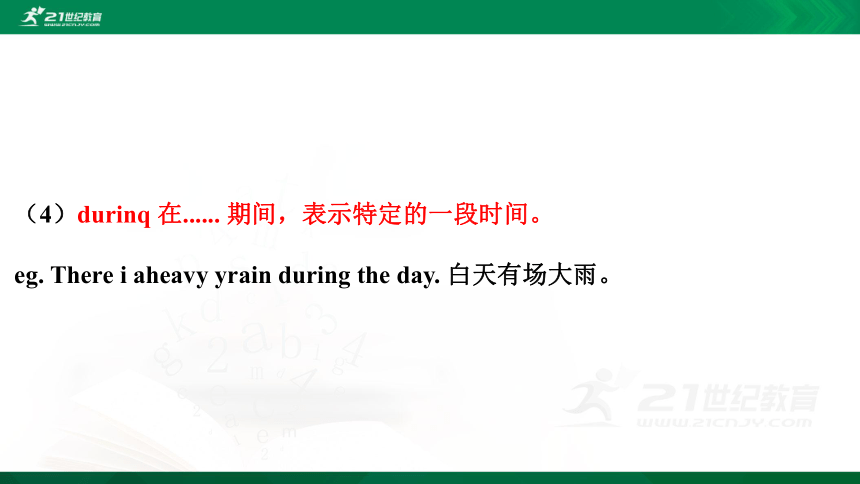
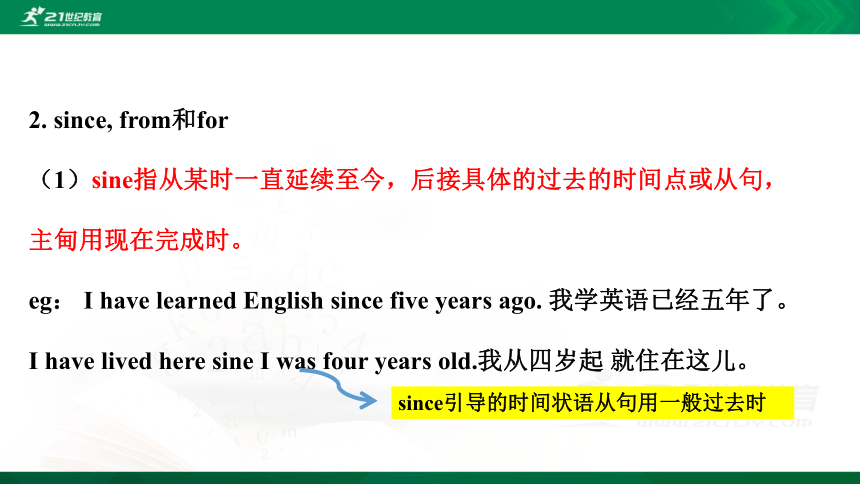
文档简介
(共55张PPT)
第二篇
专项提升
第二部分
词类梳理
第六节
介词
知识梳理
介词又称前置词,一般位于名词或代词前,表示该词与句子其他成分的关系。介词是虚词,一般在句子中不重读,也不能单独充当句子成分,但它与它的宾语一起构成介词短语,就可以在句子中做状语、定语、表语和宾语补足语。
一、介词的概述
介词
介词短语
时间介词
介词分类
地点介词
介词+名词
方式介词
动词+介词
be+形容词+介词
知识点1
介词的定义及句法功能
介词是一种用来表示词与词、词与句之间的关系的虚词,在句中不能单独作句子成分。在句中使用时,后面必须接宾语构成介词短语,才能表达完整的意义。介词短语在句中常作状语、定语、表语或宾语补足语。
eg:This
knife
is
for
ctting
bread.
这把小刀是用于切面包的。(作表语)
Don't
touch
it
with
your
hands
.
别用手去摸它。(作
状语)
This
is
thebest
way
of
doing
it.
这是做此事最好的方法。(作定语)
I
found
evernything
in
good
condition.
我发现一切正常。(作宾语补足语)
1.
at,in,on和during
(1)at多用于表示具体的钟点时刻,夜里、中午、黎明等名词前。
eg:at
six
oclock在六点
at
noon
在中午
at
niqht在晚上
at
dawn在黎明
The
meeting
will
begin
at
3
o'clock.
会议将于3点开始。
知识点2
介词的分类
(2)in用在某个世纪、某年、某月、某个季节前或泛指某一天的上午、下午和晚上。
eg:in
the
2lst
century在21世纪
in
2008
在2008年
in
summer在夏天
in
the
morning/afternoon/evening
在早土/
下午/晚上
in
October
在10月
My
grandpa
died
in
1971.
我的祖父于1971年去世。
注意!
in还可以表示“从现在起多长时间之后”,构成“in+时间段”结构,常用于一般将来时态。
eg:They
will
fish
thewok
in
an
hour.
一个小时后他们将完成工作.
知识点1
(3)on用于星期前或具体的某一天的上午下午和晚上前。
eg:on
Monday
在星期一
on
Tuesday
morning
在周二早上
on
the
evening
of
October
1st在十月一日的晚上
on也可用在公共节假日之前
eg:on
Teachers'
Day在教师节
on
Childern's
Day
在儿童节
Children
usually
wear
new
clothes
on
New
Year's
Day.
孩子们通常在新年那天穿新衣。
注意!
在以this,that,
next,
last,
every等开头的表示时间的短语之前应省略介词。
eg:I
willgo
soping
with
Mary
netSunday.
下周日我将
会和玛丽去购物。
(4)durinq
在......
期间,表示特定的一段时间。
eg.
There
i
aheavy
yrain
during
the
day.
白天有场大雨。
2.
since,
from和for
(1)sine指从某时一直延续至今,后接具体的过去的时间点或从句,主甸用现在完成时。
eg:
I
have
learned
English
since
five
years
ago.
我学英语已经五年了。
I
have
lived
here
sine
I
was
four
years
old.我从四岁起
就住在这儿。
since引导的时间状语从句用一般过去时
(2)fom说明开始的时间,常与切连用,指动作的开始时间和结束时间。
eg:
From
now
on,
I'll
read
English
in
the
morning.
从今以后,我将会在早晨读英语。
We
go
to
school
from
Monday
to
Friday.
我们从周一到周五去上学。
(3)for指动作延续贯穿整个过程,后接时间段,常用于现在完成时。
eg:
I
have
kept
this
book
for
three
days
.
这本书我已经借了三天了。
3.after和in
(1)after后接一段时间,表示从过去时间为起点的“一段时间以后”,常用于过去时;after后接时间点,表示在某一时刻之后,常用于将来时。
eg:He
came
back
after
three
days.
三天后他回来了。
My
uncle
will
come
back
after
two
o'clock.
我叔叔将在两点后回来。
(2)
in后接一段时间,表示以现在时间为起点的“一段时间之后”,常用于将来时。
eg:Students
will
study
at
home
on
computers
in
l00
years.
一百年后,学生们将在家通过电脑学习。
4.
until和by
(1)
until用于否定句中,即not...
until
...常与非廷续性动词连用,如open,
start,
leave,
arrive,
finish
等;
until
用于肯定句中意为“直到......为止”,主句的谓语动词必须是延续性动词,如live,
wait,stay,work,continue等。
eg:
We
won't
leave
until
Tom
comes.
我们会等到汤姆来后再离开。
He
will
be
working
until
five
oclck.
他将一直工作到五点钟。
(2)by
+时间点,表示“到....
时间为止”。by
十将来的时间点,用一般将进行的来时态;
by
+过去的时间点,用过去完成时态。
eg:
We
wil
learn
300
words
by
the
end
of
this
term.
到这个学期末,我们将学会300个单词。
My
father
had
read
three
novels
by
last
month
.
到上个月为上,我的爸爸已经读3三本小说。
5.
after和before
after和before
表示时间,分别意为“在..以后”和“在....以前”。
eg:I
will
play
basketball
with
my
friends
after
class
.
放学后我将会和朋友们去打篮球。
Please
wash
your
hands
before
meals.
饭前请洗手。
1.
in,on和at
in表示.“...内”,用于内部;
on
表示“在...上面”,用于表面接触。当表示在某地时,at后接较小的地点,in后接较大的地点。
eg:
what's
in
the
box
?
盒子里有什么?
There
is
a
pen
on
the
desk.
桌子上有一支钢笔。
at
the
bus
stop
在车站
in
China
中国
表示地点的介词
2.
above
,over
和on
above
.....
上方,不一定垂直,与below是反义词。
over指在物体的正上方,表示垂直的上方,与under是反义词。
on表示.....上面”,两个物体是相互接触的。
The
plane
is
flying
above
the
clouds.
飞机在云层上方飞行。
There
is
a
bridge
over
the
river.河上有一座桥。
They
put
some
flowers
on
the
teacher's
desk.
他们把一些花放在讲桌上。
over还可译为‘超过”,相当于more
than
above
over
on
below
under
3.across,
through
和over
across“横过,横穿”,表示动作是在某一物体的表面进行的,强调从一边到另一边,常用于指过河,过桥,过马路等;
through
“通过,穿过”,表示动作是在某一空间内进行的,强调从内部穿过,常指穿过森林、公
园,沿着马路走,阳光穿过窗户等;
over
“.....
上方跨过”,多指空间范围上越过,常用来指翻越墙、篱笆、山脉等。
through
across
over
eg:Be
careful
when
you
go
across
the
street.
过马路时要小心。
The
sunlight
comes
through
the
window.
阳光透过窗户照射进来。
He
jumped
over
the
wall.
他跳过了墙.
4.表示方位的介词in,
on,
to
in表示在某个范围之内;
on表示与某地相邻(接壤)
;
to表示在某个范围之外或隔海相望。
eg:Changchun
is
in
the
north
ofChina.
长春在中国的北部。
Guangdong
Province
is
on
the
southeast
of
Guangxi.
广东省在广西省的东南边.
Japan
is
to
the
east
of
China
.
日本在中国的东面。
5.in
font
of
和in
the
front
of
in
font
of
“在......之前”。指在是一物体外部的前面;in
the
front
of意为“在......的前部”,指在某一物体内部的前面。
eg,
Many
sits
in
front
of
me.
玛丽坐在我前面。
Our
teacher
always
stands
in
the
front
of
the
classroom.
我们老师总是站在教室的前面。
6.betwen
和among
都表示“在......当中”,between强调在两者之间,常和and连用;among强调在三者或三者以上之间。
eg:Mary
sits
between
Amy
and
Sarah.
玛丽坐在埃米和莎拉之间。
The
teacher
stands
among
the
students.
老师站在学生们中间。
7.in
和into
in是表示物球位置的静态介词,侧重状态,表示“在......里面”
;
into是表示动作方向的动态介词,表示运动或变化,侧重动作,常与表示动作的词(如come,go,run等)连用,意为“进入......”.
eg:They
are
sitting
in
the
room.
他们正在房间里坐着。
He
ran
into
the
room
just
now.
刚才他跑进了房间。
另外,in还可以用作副词,
意为“在家,在里面,进入”,而into不能.
eg:Is
Tom
in?
汤姆在家吗?
May
I
come
in?我可以进来吗?
in
into
(1)by直接如交通工具,交通工具前不用任何限定词。
eg:by
bike
骑自行车
by
plane=by
air
乘飞机
by
boat乘船
表示方式、方法、途径的介词
(2)用in或on表示交通方式时,交通工具前应有冠词、物主代词或指示代词等修饰。在开放式和半开放式交通工具前用on,在封闭式交通工具前用in。
eg:on
my
bike
骑自行车
in
my
fathrer's
car
坐我爸爸的车
2.by,in,
with表示手段和工具
(1)
by意为“通过、用”,表示用某种方式和手段,后接名词或动名词。
eg:This
pair
of
shoes
is
made
by
hand.
这双鞋是手工做的。
(2)in表示使用集种语言或使用某种村料。语言、村料前不加任何冠词。eg:Can
you
say
it
in
Englih
?你能用英语说吗?
They
paid
in
cach.
他们用现金支付。
(3)with表示“用,以,借的于”,后跟具体的工具。
eg:I
often
do
my
homework
with
a
pen.
我经常用钢笔做作业。
其他意义的介词
(1)exexcept
除......以外,强澜从整体中除去其后的内容。表递减
eg:I
like
all
the
subjects
except
English.
除了英语之外,我喜欢其他资料。
(2)beside
除......以外,还有......,指在原来的基础上再加上besides后面的人或物。即后面的内容包括在整体之内。表递增
eg:I
have
a
few
good
friends
besides
you.
除你之外,
我还有一些好朋友。
要注意beside和besides的区别,bside为介词,意恩是“在....
旁边”
2.about和on
两者都有“关于”的意思,一般情况下可以互换,但二者略有区别。abut常用于简单或浅显的问题的论述,是一般用语;明用于象统论述。学术报告或专疑演讲,学术性较强。
eg:The
teacher
told
us
a
story
about
Lei
Feng
.
老师给我们讲了一个关于雷锋的故事。
He
will
give
us
a
talk
on
the
history
of
the
Party
.
他将给我们作一个关于党史的报告.
3.with和without
with表示“带有、具有”;
without
表示“无,没有”。
eg:I
bought
a
big
house
with
a
swimming
pool.
我买3个带游泳池的大房子。
Fish
cant
live
without
water.
鱼离开水不能存活
。
4.of和in用于最高级结构中的区别
(1)of表示同一类人或事物中的最高级词。
eg:Tom
is
the
shorest
boy
of
the
six
.汤姆是六个男孩中最矮的一个。(2)
in表示在某个范围内的最高级。
eg:Mary
is
the
most
outgoing
girl
in
her
class.
玛丽是她们班里最外向的女孩。
介词的搭配
知识点3
1.介词与名词的搭配
eg:at
breakfast
吃早饭
at
work在工作
on
duty值日
on
time准时
onfoot步行
in
trouble
处于困境之中
in
time
及时
in
a
minute一会儿
in
a
hurry
匆忙
知识点3
2.介词与动词的搭配
eg:arrive
at/in到达
aqree
with同意
lookat看
dpend
on依靠
hear
from收...的来信
worry
about
担心
laugh
at嘲笑
work
on从事,
致力于
动词+介词
agree
with
同意
ask
for
要求
belong
to
属于
get
on
上(车)
get
off
下(车)
get
to
到达
hold
on
等一等
listen
to
听
look
at
看
look
after
照顾
look
for寻找
look
up
查找
look
like
看上去像
be
made
from
由……制成(看不出原材料)
be
made
of
由……制成(能看出原材料)
put
on
穿上
put
off
推迟
wait
for
等待
want
to想要
put
away
收拾
worry
about
为……担忧
介词的搭配
知识点3
3.be+形容词+介词
eg:at
once立刻
with
one's
help=with
the
help
of
sb.
在某人的帮助下by
the
way
顺便说一下
by
the
end
of...
到......为止
the
one's
surprise
使某人吃惊的是
in
one's
thirties
在某人三十几岁时
on
the
weekend
在周末
on
one's
way
to...
在某人去......的路上
be+形容词+介词
be
afraid
of
害怕
be
angry
with
生气
be
close
to
接近于
be
famous
for
因……出名
be
full
of
充满
be
good
at
擅长于
be
proud
of
为……感到自豪
be
short
of
缺乏
be
late
for
迟到……
be
sorry
for
对……抱歉
be
strict
with
sb.
对某人严格
be
strict
in
sth.
对某事严格
be
interested
in
对……感兴趣
be
different
from
与……不同
知识点4
考点精析
考查介词在句子中的正确运用
考点1
【例1】Read
and
fill.
用适当的介词填空。
1.
The
book
is
made
__________
wood.
2.
The
table
is
made
__________
wood.
3.
The
fan
is
made
__________
China.
4.
The
model
plane
is
made
__________
Tom.
解析:本题考查介词的运用。be
made后面接上不同的介词,所表达的意思不同。be
made
of和be
made
from都是指“由什么制成”,但是be
made
of指从制成品可以直接清楚地看出原材料是什么;be
made
from指从制成品看不出原材料是什么;be
made
in指“在哪里制造”;be
made
by指“由谁制造”。
答案:1.
2.
3.
4.
from
of
in
by
考查介词的用法
考点2
【例2】Read,
choose
and
fill.
选择合适的单词填空。
at,on,in
It's
______two
o'clock_____the
afternoon
of
October
4th.
解析:two
o'clock是时间点,时间点前应该用介词at;the
afternoon
of
October
4th是指具体的某一天,其前面应使用介词on。
答案:
at,on
一、Read
and
fill.
用适当的介词填空。
1.
A:When
do
you
get
up?
B:I
often
get
up___6
o'clock.
2.
I
often
go
shopping
_____
my
mum.
3.
Look
_____the
monkey,it's
sleeping.
4.
Children's
Day
is____June.
5.
My
birthday
is
____March
5th.
at
with
at
举一反三
in
on
二、Read
and
choose.
单项填空。
(
)1.
_______summer,I
often
go
swimming
.
A.
in
B.
On
C.
In
(
)2.
I
am______China.
A.
come
B.
from
C.
/
(
)3.
Today
is
warm
and
cool
in
Sanya,what____you?
A.
are
B.
is
C.
about
(
)4.
I
go
to
school____bus.
A.
take
B.
/
C.
by
C
B
C
C
1.
_____
summer
2.
_____
home
3.
_____
bike
4.
_____
front
of
5.
_____
way
of
6.
_____
May
6th
7.
_____
China
8.
listen
_____
9.
angry
_____
10.
clever
_____
一、Read
and
write.
在下列横线上填上适当的介词。
in
过关检测
at
by
in
by
on
in
to
about
about
二、Read
and
choose.
单项填空。
(
)1.
________
a
few
days
I
felt
much
better.
A.
After
B.
In
C.
On
(
)2.
My
house
is
just
__________
the
street.
A.
the
B.
across
C.
/
(
)3.
We
left
there
__________
six
o'click.
A.
about
B.
in
C.
on
(
)4.
Ladies
__________gentlemen.
A.
after
B.
for
C.
brfore
A
B
A
C
(
)5.
I
was__________
my
uncle's
yesterday.
A.
in
B.
at
C.
for
(
)6.
A
river
flows__________
its
banks.
A.
so
B.
between
C.
until
(
)7.
Fish
were
swimming
__________
the
surface
of
water.
A.
below
B.
or
C.
but
(
)8.
He
makes
a
living
__________
teaching.
A.
/
B.
to
C.
by
B
B
A
C
三、Read
and
write.
连词成句。
1.
is
birthday
in
May
Amy's
__________________________________________________________
2.
will
morning
of
meet
I
best
my
friend
on
June
the
1st
__________________________________________________________
3.
keep
by
it
doing
you
may
them
themselves
from
__________________________________________________________
Amy's
birthday
is
in
May
.
I
will
meet
my
best
friend
on
the
morning
of
June
1st.
You
may
keep
them
from
doing
it
by
themeslves.
四、Read
and
fill.
根据句意或中文提示,用适当的介词填空。
1.
ChenJie
is
__________
the
China.
She
is
an
Chinesegirl.
2.
Look!My
book
is
__________
(在……上面)
the
chair.
3.
I
can't
leave
my
house
__________
(直到)
my
mother
comes
back.
4.
A:Are
you
looking
__________
her
English
book?
B:Yes.
But
I
can't
find
it
anywhere.
from
on
until
for
5.
Sarah's
grandma's
birthday
is
__________
September
.
6.
I
go
shopping
__________
my
brother.
7.
This
T-shirt
is
different
__________
that
one.
8.
Chen
Jie
sits
__________
the
middle
__________
the
living
room.
9.
Amy
is
behind
Sarah.
Sarah
is
__________
Amy.
10.
He
is
playing
football,
__________
it
starts
to
rain.
in
with
from
in
of
in
front
of
but
谢谢
21世纪教育网(www.21cnjy.com)
中小学教育资源网站
有大把高质量资料?一线教师?一线教研员?
欢迎加入21世纪教育网教师合作团队!!月薪过万不是梦!!
详情请看:
https://www.21cnjy.com/help/help_extract.php
第二篇
专项提升
第二部分
词类梳理
第六节
介词
知识梳理
介词又称前置词,一般位于名词或代词前,表示该词与句子其他成分的关系。介词是虚词,一般在句子中不重读,也不能单独充当句子成分,但它与它的宾语一起构成介词短语,就可以在句子中做状语、定语、表语和宾语补足语。
一、介词的概述
介词
介词短语
时间介词
介词分类
地点介词
介词+名词
方式介词
动词+介词
be+形容词+介词
知识点1
介词的定义及句法功能
介词是一种用来表示词与词、词与句之间的关系的虚词,在句中不能单独作句子成分。在句中使用时,后面必须接宾语构成介词短语,才能表达完整的意义。介词短语在句中常作状语、定语、表语或宾语补足语。
eg:This
knife
is
for
ctting
bread.
这把小刀是用于切面包的。(作表语)
Don't
touch
it
with
your
hands
.
别用手去摸它。(作
状语)
This
is
thebest
way
of
doing
it.
这是做此事最好的方法。(作定语)
I
found
evernything
in
good
condition.
我发现一切正常。(作宾语补足语)
1.
at,in,on和during
(1)at多用于表示具体的钟点时刻,夜里、中午、黎明等名词前。
eg:at
six
oclock在六点
at
noon
在中午
at
niqht在晚上
at
dawn在黎明
The
meeting
will
begin
at
3
o'clock.
会议将于3点开始。
知识点2
介词的分类
(2)in用在某个世纪、某年、某月、某个季节前或泛指某一天的上午、下午和晚上。
eg:in
the
2lst
century在21世纪
in
2008
在2008年
in
summer在夏天
in
the
morning/afternoon/evening
在早土/
下午/晚上
in
October
在10月
My
grandpa
died
in
1971.
我的祖父于1971年去世。
注意!
in还可以表示“从现在起多长时间之后”,构成“in+时间段”结构,常用于一般将来时态。
eg:They
will
fish
thewok
in
an
hour.
一个小时后他们将完成工作.
知识点1
(3)on用于星期前或具体的某一天的上午下午和晚上前。
eg:on
Monday
在星期一
on
Tuesday
morning
在周二早上
on
the
evening
of
October
1st在十月一日的晚上
on也可用在公共节假日之前
eg:on
Teachers'
Day在教师节
on
Childern's
Day
在儿童节
Children
usually
wear
new
clothes
on
New
Year's
Day.
孩子们通常在新年那天穿新衣。
注意!
在以this,that,
next,
last,
every等开头的表示时间的短语之前应省略介词。
eg:I
willgo
soping
with
Mary
netSunday.
下周日我将
会和玛丽去购物。
(4)durinq
在......
期间,表示特定的一段时间。
eg.
There
i
aheavy
yrain
during
the
day.
白天有场大雨。
2.
since,
from和for
(1)sine指从某时一直延续至今,后接具体的过去的时间点或从句,主甸用现在完成时。
eg:
I
have
learned
English
since
five
years
ago.
我学英语已经五年了。
I
have
lived
here
sine
I
was
four
years
old.我从四岁起
就住在这儿。
since引导的时间状语从句用一般过去时
(2)fom说明开始的时间,常与切连用,指动作的开始时间和结束时间。
eg:
From
now
on,
I'll
read
English
in
the
morning.
从今以后,我将会在早晨读英语。
We
go
to
school
from
Monday
to
Friday.
我们从周一到周五去上学。
(3)for指动作延续贯穿整个过程,后接时间段,常用于现在完成时。
eg:
I
have
kept
this
book
for
three
days
.
这本书我已经借了三天了。
3.after和in
(1)after后接一段时间,表示从过去时间为起点的“一段时间以后”,常用于过去时;after后接时间点,表示在某一时刻之后,常用于将来时。
eg:He
came
back
after
three
days.
三天后他回来了。
My
uncle
will
come
back
after
two
o'clock.
我叔叔将在两点后回来。
(2)
in后接一段时间,表示以现在时间为起点的“一段时间之后”,常用于将来时。
eg:Students
will
study
at
home
on
computers
in
l00
years.
一百年后,学生们将在家通过电脑学习。
4.
until和by
(1)
until用于否定句中,即not...
until
...常与非廷续性动词连用,如open,
start,
leave,
arrive,
finish
等;
until
用于肯定句中意为“直到......为止”,主句的谓语动词必须是延续性动词,如live,
wait,stay,work,continue等。
eg:
We
won't
leave
until
Tom
comes.
我们会等到汤姆来后再离开。
He
will
be
working
until
five
oclck.
他将一直工作到五点钟。
(2)by
+时间点,表示“到....
时间为止”。by
十将来的时间点,用一般将进行的来时态;
by
+过去的时间点,用过去完成时态。
eg:
We
wil
learn
300
words
by
the
end
of
this
term.
到这个学期末,我们将学会300个单词。
My
father
had
read
three
novels
by
last
month
.
到上个月为上,我的爸爸已经读3三本小说。
5.
after和before
after和before
表示时间,分别意为“在..以后”和“在....以前”。
eg:I
will
play
basketball
with
my
friends
after
class
.
放学后我将会和朋友们去打篮球。
Please
wash
your
hands
before
meals.
饭前请洗手。
1.
in,on和at
in表示.“...内”,用于内部;
on
表示“在...上面”,用于表面接触。当表示在某地时,at后接较小的地点,in后接较大的地点。
eg:
what's
in
the
box
?
盒子里有什么?
There
is
a
pen
on
the
desk.
桌子上有一支钢笔。
at
the
bus
stop
在车站
in
China
中国
表示地点的介词
2.
above
,over
和on
above
.....
上方,不一定垂直,与below是反义词。
over指在物体的正上方,表示垂直的上方,与under是反义词。
on表示.....上面”,两个物体是相互接触的。
The
plane
is
flying
above
the
clouds.
飞机在云层上方飞行。
There
is
a
bridge
over
the
river.河上有一座桥。
They
put
some
flowers
on
the
teacher's
desk.
他们把一些花放在讲桌上。
over还可译为‘超过”,相当于more
than
above
over
on
below
under
3.across,
through
和over
across“横过,横穿”,表示动作是在某一物体的表面进行的,强调从一边到另一边,常用于指过河,过桥,过马路等;
through
“通过,穿过”,表示动作是在某一空间内进行的,强调从内部穿过,常指穿过森林、公
园,沿着马路走,阳光穿过窗户等;
over
“.....
上方跨过”,多指空间范围上越过,常用来指翻越墙、篱笆、山脉等。
through
across
over
eg:Be
careful
when
you
go
across
the
street.
过马路时要小心。
The
sunlight
comes
through
the
window.
阳光透过窗户照射进来。
He
jumped
over
the
wall.
他跳过了墙.
4.表示方位的介词in,
on,
to
in表示在某个范围之内;
on表示与某地相邻(接壤)
;
to表示在某个范围之外或隔海相望。
eg:Changchun
is
in
the
north
ofChina.
长春在中国的北部。
Guangdong
Province
is
on
the
southeast
of
Guangxi.
广东省在广西省的东南边.
Japan
is
to
the
east
of
China
.
日本在中国的东面。
5.in
font
of
和in
the
front
of
in
font
of
“在......之前”。指在是一物体外部的前面;in
the
front
of意为“在......的前部”,指在某一物体内部的前面。
eg,
Many
sits
in
front
of
me.
玛丽坐在我前面。
Our
teacher
always
stands
in
the
front
of
the
classroom.
我们老师总是站在教室的前面。
6.betwen
和among
都表示“在......当中”,between强调在两者之间,常和and连用;among强调在三者或三者以上之间。
eg:Mary
sits
between
Amy
and
Sarah.
玛丽坐在埃米和莎拉之间。
The
teacher
stands
among
the
students.
老师站在学生们中间。
7.in
和into
in是表示物球位置的静态介词,侧重状态,表示“在......里面”
;
into是表示动作方向的动态介词,表示运动或变化,侧重动作,常与表示动作的词(如come,go,run等)连用,意为“进入......”.
eg:They
are
sitting
in
the
room.
他们正在房间里坐着。
He
ran
into
the
room
just
now.
刚才他跑进了房间。
另外,in还可以用作副词,
意为“在家,在里面,进入”,而into不能.
eg:Is
Tom
in?
汤姆在家吗?
May
I
come
in?我可以进来吗?
in
into
(1)by直接如交通工具,交通工具前不用任何限定词。
eg:by
bike
骑自行车
by
plane=by
air
乘飞机
by
boat乘船
表示方式、方法、途径的介词
(2)用in或on表示交通方式时,交通工具前应有冠词、物主代词或指示代词等修饰。在开放式和半开放式交通工具前用on,在封闭式交通工具前用in。
eg:on
my
bike
骑自行车
in
my
fathrer's
car
坐我爸爸的车
2.by,in,
with表示手段和工具
(1)
by意为“通过、用”,表示用某种方式和手段,后接名词或动名词。
eg:This
pair
of
shoes
is
made
by
hand.
这双鞋是手工做的。
(2)in表示使用集种语言或使用某种村料。语言、村料前不加任何冠词。eg:Can
you
say
it
in
Englih
?你能用英语说吗?
They
paid
in
cach.
他们用现金支付。
(3)with表示“用,以,借的于”,后跟具体的工具。
eg:I
often
do
my
homework
with
a
pen.
我经常用钢笔做作业。
其他意义的介词
(1)exexcept
除......以外,强澜从整体中除去其后的内容。表递减
eg:I
like
all
the
subjects
except
English.
除了英语之外,我喜欢其他资料。
(2)beside
除......以外,还有......,指在原来的基础上再加上besides后面的人或物。即后面的内容包括在整体之内。表递增
eg:I
have
a
few
good
friends
besides
you.
除你之外,
我还有一些好朋友。
要注意beside和besides的区别,bside为介词,意恩是“在....
旁边”
2.about和on
两者都有“关于”的意思,一般情况下可以互换,但二者略有区别。abut常用于简单或浅显的问题的论述,是一般用语;明用于象统论述。学术报告或专疑演讲,学术性较强。
eg:The
teacher
told
us
a
story
about
Lei
Feng
.
老师给我们讲了一个关于雷锋的故事。
He
will
give
us
a
talk
on
the
history
of
the
Party
.
他将给我们作一个关于党史的报告.
3.with和without
with表示“带有、具有”;
without
表示“无,没有”。
eg:I
bought
a
big
house
with
a
swimming
pool.
我买3个带游泳池的大房子。
Fish
cant
live
without
water.
鱼离开水不能存活
。
4.of和in用于最高级结构中的区别
(1)of表示同一类人或事物中的最高级词。
eg:Tom
is
the
shorest
boy
of
the
six
.汤姆是六个男孩中最矮的一个。(2)
in表示在某个范围内的最高级。
eg:Mary
is
the
most
outgoing
girl
in
her
class.
玛丽是她们班里最外向的女孩。
介词的搭配
知识点3
1.介词与名词的搭配
eg:at
breakfast
吃早饭
at
work在工作
on
duty值日
on
time准时
onfoot步行
in
trouble
处于困境之中
in
time
及时
in
a
minute一会儿
in
a
hurry
匆忙
知识点3
2.介词与动词的搭配
eg:arrive
at/in到达
aqree
with同意
lookat看
dpend
on依靠
hear
from收...的来信
worry
about
担心
laugh
at嘲笑
work
on从事,
致力于
动词+介词
agree
with
同意
ask
for
要求
belong
to
属于
get
on
上(车)
get
off
下(车)
get
to
到达
hold
on
等一等
listen
to
听
look
at
看
look
after
照顾
look
for寻找
look
up
查找
look
like
看上去像
be
made
from
由……制成(看不出原材料)
be
made
of
由……制成(能看出原材料)
put
on
穿上
put
off
推迟
wait
for
等待
want
to想要
put
away
收拾
worry
about
为……担忧
介词的搭配
知识点3
3.be+形容词+介词
eg:at
once立刻
with
one's
help=with
the
help
of
sb.
在某人的帮助下by
the
way
顺便说一下
by
the
end
of...
到......为止
the
one's
surprise
使某人吃惊的是
in
one's
thirties
在某人三十几岁时
on
the
weekend
在周末
on
one's
way
to...
在某人去......的路上
be+形容词+介词
be
afraid
of
害怕
be
angry
with
生气
be
close
to
接近于
be
famous
for
因……出名
be
full
of
充满
be
good
at
擅长于
be
proud
of
为……感到自豪
be
short
of
缺乏
be
late
for
迟到……
be
sorry
for
对……抱歉
be
strict
with
sb.
对某人严格
be
strict
in
sth.
对某事严格
be
interested
in
对……感兴趣
be
different
from
与……不同
知识点4
考点精析
考查介词在句子中的正确运用
考点1
【例1】Read
and
fill.
用适当的介词填空。
1.
The
book
is
made
__________
wood.
2.
The
table
is
made
__________
wood.
3.
The
fan
is
made
__________
China.
4.
The
model
plane
is
made
__________
Tom.
解析:本题考查介词的运用。be
made后面接上不同的介词,所表达的意思不同。be
made
of和be
made
from都是指“由什么制成”,但是be
made
of指从制成品可以直接清楚地看出原材料是什么;be
made
from指从制成品看不出原材料是什么;be
made
in指“在哪里制造”;be
made
by指“由谁制造”。
答案:1.
2.
3.
4.
from
of
in
by
考查介词的用法
考点2
【例2】Read,
choose
and
fill.
选择合适的单词填空。
at,on,in
It's
______two
o'clock_____the
afternoon
of
October
4th.
解析:two
o'clock是时间点,时间点前应该用介词at;the
afternoon
of
October
4th是指具体的某一天,其前面应使用介词on。
答案:
at,on
一、Read
and
fill.
用适当的介词填空。
1.
A:When
do
you
get
up?
B:I
often
get
up___6
o'clock.
2.
I
often
go
shopping
_____
my
mum.
3.
Look
_____the
monkey,it's
sleeping.
4.
Children's
Day
is____June.
5.
My
birthday
is
____March
5th.
at
with
at
举一反三
in
on
二、Read
and
choose.
单项填空。
(
)1.
_______summer,I
often
go
swimming
.
A.
in
B.
On
C.
In
(
)2.
I
am______China.
A.
come
B.
from
C.
/
(
)3.
Today
is
warm
and
cool
in
Sanya,what____you?
A.
are
B.
is
C.
about
(
)4.
I
go
to
school____bus.
A.
take
B.
/
C.
by
C
B
C
C
1.
_____
summer
2.
_____
home
3.
_____
bike
4.
_____
front
of
5.
_____
way
of
6.
_____
May
6th
7.
_____
China
8.
listen
_____
9.
angry
_____
10.
clever
_____
一、Read
and
write.
在下列横线上填上适当的介词。
in
过关检测
at
by
in
by
on
in
to
about
about
二、Read
and
choose.
单项填空。
(
)1.
________
a
few
days
I
felt
much
better.
A.
After
B.
In
C.
On
(
)2.
My
house
is
just
__________
the
street.
A.
the
B.
across
C.
/
(
)3.
We
left
there
__________
six
o'click.
A.
about
B.
in
C.
on
(
)4.
Ladies
__________gentlemen.
A.
after
B.
for
C.
brfore
A
B
A
C
(
)5.
I
was__________
my
uncle's
yesterday.
A.
in
B.
at
C.
for
(
)6.
A
river
flows__________
its
banks.
A.
so
B.
between
C.
until
(
)7.
Fish
were
swimming
__________
the
surface
of
water.
A.
below
B.
or
C.
but
(
)8.
He
makes
a
living
__________
teaching.
A.
/
B.
to
C.
by
B
B
A
C
三、Read
and
write.
连词成句。
1.
is
birthday
in
May
Amy's
__________________________________________________________
2.
will
morning
of
meet
I
best
my
friend
on
June
the
1st
__________________________________________________________
3.
keep
by
it
doing
you
may
them
themselves
from
__________________________________________________________
Amy's
birthday
is
in
May
.
I
will
meet
my
best
friend
on
the
morning
of
June
1st.
You
may
keep
them
from
doing
it
by
themeslves.
四、Read
and
fill.
根据句意或中文提示,用适当的介词填空。
1.
ChenJie
is
__________
the
China.
She
is
an
Chinesegirl.
2.
Look!My
book
is
__________
(在……上面)
the
chair.
3.
I
can't
leave
my
house
__________
(直到)
my
mother
comes
back.
4.
A:Are
you
looking
__________
her
English
book?
B:Yes.
But
I
can't
find
it
anywhere.
from
on
until
for
5.
Sarah's
grandma's
birthday
is
__________
September
.
6.
I
go
shopping
__________
my
brother.
7.
This
T-shirt
is
different
__________
that
one.
8.
Chen
Jie
sits
__________
the
middle
__________
the
living
room.
9.
Amy
is
behind
Sarah.
Sarah
is
__________
Amy.
10.
He
is
playing
football,
__________
it
starts
to
rain.
in
with
from
in
of
in
front
of
but
谢谢
21世纪教育网(www.21cnjy.com)
中小学教育资源网站
有大把高质量资料?一线教师?一线教研员?
欢迎加入21世纪教育网教师合作团队!!月薪过万不是梦!!
详情请看:
https://www.21cnjy.com/help/help_extract.php
